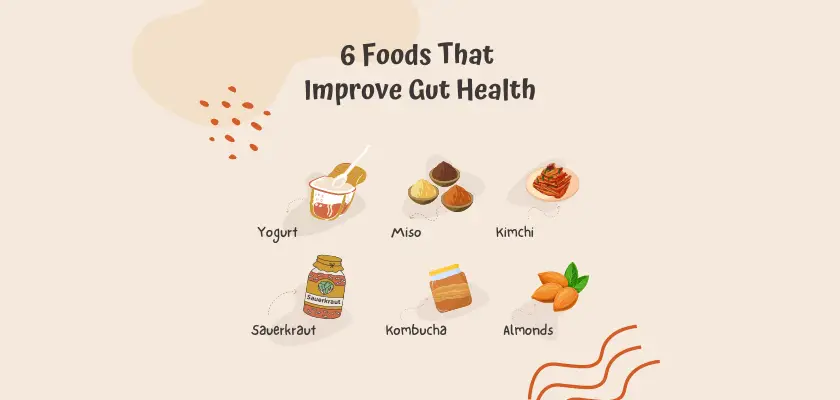Enhance Your Gut Health with Thiamine: Simple Biohacking Tips
In this article, we’ll explore a simple yet effective way to boost your gut health through the power of thiamine, a vital nutrient.
We’ll break down the benefits and techniques in an easy-to-understand manner, helping you achieve a healthier gut for overall well-being.
Understanding Thiamine and Its Importance:
Thiamine, also known as vitamin B1, is a crucial nutrient that plays a key role in converting food into energy. It’s essential for maintaining proper nerve function, supporting cardiovascular health, and, importantly, aiding digestion.
By ensuring an adequate intake of thiamine, you’re providing your gut with the necessary support to function optimally.
Thiamine, also known as vitamin B1, is essential for the gut due to its significant impact on various aspects of digestive health.
This nutrient plays a vital role in maintaining the proper functioning of the gastrointestinal system, supporting digestion, and ensuring overall gut well-being.

Let’s explore why thiamine is important for the gut:
Biohacking Your Gut With Thiamine|B1
Energy Production:
Thiamine is a key player in the process of converting carbohydrates from food into energy. The cells lining the digestive tract require energy to carry out their functions effectively.
By aiding in energy production, thiamine ensures that these cells have the necessary resources to perform tasks such as absorbing nutrients and transporting them across the gut wall.
Related Articles
Thiamine deficiency eye symptoms
Thiamine deficiency and bladder problems
Nerve Function:
The gut is home to an extensive network of nerves, often referred to as the “second brain” or enteric nervous system.
Thiamine is essential for maintaining the health and proper functioning of these nerves. It helps transmit signals that regulate the movement of food through the digestive tract, the release of digestive enzymes, and the communication between the gut and the brain.
Enzyme Activation:
Thiamine is a cofactor for several enzymes involved in carbohydrate metabolism. These enzymes play a crucial role in breaking down complex carbohydrates into simpler sugars that can be absorbed by the body.
This breakdown is a fundamental step in the digestive process, as it allows the nutrients in food to be absorbed and utilized by the body.
Supporting Gut Lining Integrity:
Thiamine contributes to the maintenance of the gut’s mucosal lining, which serves as a protective barrier against harmful substances.
A healthy gut lining prevents unwanted particles, toxins, and pathogens from entering the bloodstream and causing inflammation or other health issues.

Preventing Digestive Disorders:
A deficiency in thiamine can lead to a condition called “beriberi,” which can affect the nervous system and various bodily functions, including digestion.
Digestive symptoms of beriberi can include loss of appetite, constipation, and indigestion. By ensuring an adequate intake of thiamine, you’re helping to prevent these potential digestive disorders.
Gut-Brain Connection:
Thiamine also plays a role in maintaining a healthy gut-brain connection. Proper nerve function and communication between the gut and the brain contribute to overall well-being, as imbalances in this connection have been linked to issues like irritable bowel syndrome (IBS) and other gastrointestinal disorders.
Biohacking Your Gut with Thiamine:
- Choose Thiamine-Rich Foods: Incorporate thiamine-rich foods into your diet. These include whole grains like brown rice and oats, lean meats like pork and poultry, legumes such as beans and lentils, and nuts like sunflower seeds. These foods not only provide thiamine but also offer fiber and other nutrients that promote gut health.
- Balanced Diet for Gut Diversity: A diverse gut microbiome is crucial for digestion and overall health. Alongside thiamine-rich foods, include a variety of fruits, vegetables, and fermented foods like yogurt and sauerkraut in your meals. This diversity supports a flourishing gut ecosystem.
- Mindful Eating Habits: Slow down and savor your meals. Chewing thoroughly and eating at a relaxed pace can aid digestion. When you’re in a rush or stressed, it can negatively impact your gut’s ability to process food efficiently.
- Limit Processed Foods and Sugar: Processed foods and excessive sugar can disrupt the balance of your gut microbiome. These foods provide little nutritional value and can lead to inflammation and digestive discomfort. Opt for natural, whole foods whenever possible.
- Stay Hydrated: Drinking enough water is essential for maintaining proper digestion. Water helps move fiber through your digestive system, preventing constipation and supporting a healthy gut.
- Consider Thiamine Supplements: If you struggle to get enough thiamine from your diet alone, you might consider a thiamine supplement. Always consult with a healthcare professional before adding any supplements to your routine.
- Manage Stress: Chronic stress can impact your gut health. Engage in stress-reduction techniques such as meditation, yoga, or deep breathing exercises to promote a balanced gut-brain connection.

Disorders of the Gut That Have Been Linked to Thiamine Deficiency
- Beriberi: Beriberi is a well-known disorder caused by severe thiamine deficiency. It can manifest in two main forms: wet beriberi and dry beriberi. In the context of gut health, gastrointestinal symptoms such as loss of appetite, constipation, and indigestion can occur. Wet beriberi primarily affects the cardiovascular system, leading to fluid accumulation and potentially causing heart failure, but it can also impact the gut.
- Wernicke-Korsakoff Syndrome: This is a severe neurological disorder often associated with alcohol misuse and thiamine deficiency. While it primarily affects the brain, it can lead to gastrointestinal symptoms such as nausea, vomiting, and weight loss. Wernicke’s encephalopathy, a component of this syndrome, can cause gut-related issues due to its impact on the nervous system controlling digestion.
- Gastrointestinal Dysfunction: Thiamine deficiency can affect the autonomic nervous system, which controls various involuntary functions, including digestion. Dysfunction of this system due to thiamine deficiency can lead to issues such as delayed gastric emptying, constipation, and gastroparesis (a condition in which the stomach takes too long to empty its contents).
- Malabsorption Syndromes: Certain conditions that result in poor absorption of nutrients, such as celiac disease, Crohn’s disease, and chronic diarrhea, can lead to decreased thiamine absorption and contribute to thiamine deficiency. Malabsorption syndromes can impact the gut’s ability to take in essential nutrients, including thiamine.
- Irritable Bowel Syndrome (IBS): While the exact relationship is not fully understood, some studies have suggested a potential link between thiamine deficiency and irritable bowel syndrome (IBS). IBS is a common gastrointestinal disorder characterized by symptoms like abdominal pain, bloating, and changes in bowel habits.
- Gastrointestinal Inflammation: Thiamine deficiency can lead to oxidative stress and inflammation, which might contribute to gut-related issues. Chronic inflammation in the gastrointestinal tract can disrupt normal digestion and potentially lead to conditions like inflammatory bowel disease (IBD) or gastritis.
- Gastroparesis: Gastroparesis is a condition characterized by delayed gastric emptying, where the stomach takes longer than usual to move food into the small intestine for digestion. Thiamine deficiency can contribute to gastroparesis in a few ways:
- Nerve Function: Thiamine is essential for maintaining proper nerve function, including the nerves that control the muscles of the digestive tract. A deficiency in thiamine can impair the signals that regulate the coordinated contractions needed for stomach emptying.
- Autonomic Nervous System: Thiamine deficiency can affect the autonomic nervous system, which controls involuntary functions like digestion. Dysfunction in this system due to thiamine deficiency can lead to abnormalities in gastric motility and contribute to gastroparesis.
- Muscle Function: Thiamine deficiency can impact the muscles of the gastrointestinal tract, including the smooth muscles that facilitate movement. Weakened muscle contractions can result in food remaining in the stomach for longer periods, causing symptoms associated with gastroparesis.
- Small Intestinal Bacterial Overgrowth (SIBO): SIBO occurs when there’s an excessive growth of bacteria in the small intestine, which can lead to various digestive symptoms. Thiamine deficiency may contribute to SIBO in the following ways:
- Gut Motility: As mentioned earlier, thiamine deficiency can impair the proper functioning of the gastrointestinal muscles. This can result in slowed movement of food through the digestive tract, providing an environment where bacteria can overgrow in the small intestine.
- Alteration of Gut Environment: Thiamine deficiency might disrupt the balance of the gut microbiota. This imbalance can create conditions that allow certain bacteria to thrive, potentially leading to SIBO.
- Immune Function: Thiamine is involved in supporting immune function, and a deficiency can weaken the body’s ability to defend against harmful bacteria. This weakened immune response may contribute to the development of SIBO.
Here’s the information about the Recommended Dietary Allowance (RDA) for thiamine. However, these amounts are wholefully inadequate. According to Elliott Overton,” extremely high concentrations of thiamine are often necessary to overcome the “metabolic block” and restore the deranged metabolism“
| Age Group | RDA for Thiamine (mg) |
|---|---|
| Infants (0-6 months) | 0.2 |
| Infants (7-12 months) | 0.3 |
| Children (1-3 years) | 0.5 |
| Children (4-8 years) | 0.6 |
| Children (9-13 years) | 0.9 (males and females) |
| Adolescents (14-18 years) | 1.2 (males), 1.0 (females) |
| Adults (19+ years) | 1.2 (males), 1.1 (females) |
| Pregnant females | 1.4 |
| Breastfeeding females | 1.5 |
If you have any of these disorders from a thiamine or B1 deficiency, you need supplements.
here are some types of thiamine supplements that are often used to address specific health concerns:
- Benfotiamine: Benfotiamine is a fat-soluble form of thiamine that has been studied for its potential benefits in managing blood sugar levels and supporting nerve health. It’s commonly used to address issues related to diabetes and diabetic neuropathy. Benfotiamine is believed to have better bioavailability and may help protect against the damaging effects of high blood sugar on nerves.
- Thiamine Complexes: Supplements containing a combination of thiamine and other B vitamins can be useful for promoting overall energy production and nervous system health. These complexes are often taken to support stress management, mental clarity, and a healthy metabolism.
- Topical Thiamine: Topical thiamine creams or lotions can be used for specific skin conditions that might benefit from thiamine’s potential anti-inflammatory and antioxidant properties. These products are typically applied directly to the affected area and are not intended for general thiamine supplementation.
- Prescription-Strength Thiamine: In cases of severe thiamine deficiency or conditions like Wernicke-Korsakoff Syndrome, healthcare professionals might prescribe high-dose thiamine supplements to address specific medical needs. These prescriptions are tailored to the individual’s condition and should only be used under medical supervision.
- Allithiamine: Allithiamine is a lipid-soluble derivative of thiamine that is naturally found in garlic. It is believed to have higher bioavailability than other forms of thiamine. Allithiamine supplements are sometimes used to support thiamine intake.
- Nerve Health Supplements: Supplements formulated specifically to support nerve health and function often contain thiamine along with other nutrients like B vitamins, antioxidants, and amino acids. These are commonly used by individuals looking to maintain or improve their nervous system function.
- Benfotiamine: Benfotiamine is a fat-soluble form of thiamine that is believed to have better bioavailability compared to other forms. It can cross cell membranes more easily, potentially leading to increased thiamine levels within cells. Benfotiamine is often used in supplements targeting nerve health and blood sugar regulation.
Before choosing a specific type of thiamine supplement for a particular health concern, it’s crucial to consult a healthcare professional. They can assess your individual needs, medical history, and potential interactions with other medications or conditions.
Conclusion
In conclusion, thiamine plays a crucial role in maintaining the health of the gastrointestinal system and overall well-being.
Its importance to the gut lies in its ability to support energy production, nerve function, enzyme activation, and gut lining integrity.
Thiamine deficiency can lead to various gut-related issues, such as delayed gastric emptying, constipation, and even more severe conditions like beriberi and Wernicke-Korsakoff Syndrome.
Biohacking your gut with thiamine involves incorporating thiamine-rich foods into your diet, maintaining a diverse diet for gut microbiome diversity, practicing mindful eating habits, managing stress, and considering thiamine supplements if necessary.
Remember that these practices contribute to better gut health and can lead to improved digestion, enhanced nutrient absorption, and a stronger gut-brain connection.

